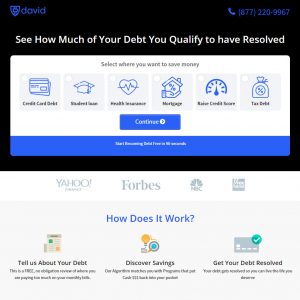
You’re already in a difficult positions – don’t led a scammer make things worse!
Some companies offering debt settlement programs may engage in deception and fail to deliver on the promises they make — for example, promises or “guarantees” to settle all your credit card debts for, say, 30 to 60 percent of the amount you owe.
Other companies may try to collect their own fees from you before they have settled any of your debts — a practice prohibited under the FTC’s Telemarketing Sales Rule (TSR) for companies engaged in telemarketing these services.
Some fail to explain the risks associated with their programs: for example, that many (or most) consumers drop out without settling their debts, that consumers’ credit reports may suffer, or that debt collectors may continue to call you.
Avoid doing business with any company that promises to settle your debt if the company:
- charges any fees before it settles your debts
- touts a “new government program” to bail out personal credit card debt
- guarantees it can make your unsecured debt go away
- tells you to stop communicating with your creditors, but doesn’t explain the serious consequences
- tells you it can stop all debt collection calls and lawsuits
- guarantees that your unsecured debts can be paid off for pennies on the dollar
Researching Debt Settlement Companies
Before you enroll in a debt settlement program, do your homework. You’re making a big decision that involves spending a lot of your money — money that could go toward paying down your debt. Check out the company with your state Attorney General and local consumer protection agency.
They can tell you if any consumer complaints are on file about the firm you’re considering doing business with. Ask your state Attorney General if the company is required to be licensed to work in your state and, if so, whether it is.
Enter the name of the company name with the word “complaints” into a search engine.
Read what others have said about the companies you’re considering, including news about any lawsuits with state or federal regulators for engaging in deceptive or unfair practices.
Fees
If you do business with a debt settlement company, you may have to put money in a dedicated bank account, which will be administered by an independent third party. The funds are yours and you are entitled to the interest that accrues.
The account administrator may charge you a reasonable fee for account maintenance, and is responsible for transferring funds from your account to pay your creditors and the debt settlement company when settlements occur.
A company can charge you only a portion of its full fee for each debt it settles. For example, say you owe money to five creditors. The company successfully negotiates a settlement with one of your creditors. The company can charge you only a portion of its full fee at this time because it still needs to successfully negotiate with four other creditors.
Each time the debt settlement company successfully settles a debt with one of your creditors, the company can charge you another portion of its full fee. If the company’s fees are based on a percentage of the amount you save through the settlement, it must tell you both the percentage it charges and the estimated dollar amount it represents. This may be called a “contingency” fee.
Disclosure Requirements
Before you sign up for the service, the debt relief company must give you information about the program:
- The price and terms: The company must explain its fees and any conditions on its services.
- Results: The company must tell you how long it will take to get results — how many months or years before it will make an offer to each creditor for a settlement.
- Offers: The company must tell you how much money or the percentage of each outstanding debt you must save before it will make an offer to each creditor on your behalf.
- Non-payment: If the company asks you to stop making payments to your creditors — or if the program relies on you to not make payments — it must tell you about the possible negative consequences of your action, including damage to your credit report and credit score; that your creditors may sue you or continue with the collections process; and that your credit card companies may charge you additional fees and interest, which will increase the amount you owe.
The debt relief company also must tell you that:
- the funds are yours and you are entitled to the interest earned;
- the account administrator is not affiliated with the debt relief provider and doesn’t get referral fees; and
- you may withdraw your money any time without penalty.
Tax Consequences
Depending on your financial condition, any savings you get from debt relief services can be considered income and taxable. Credit card companies and others may report settled debt to the IRS, which the IRS considers income, unless you are “insolvent.”
Insolvency is when your total debts are more than the fair market value of your total assets. Insolvency can be complex to determine. Talk to a tax professional if are not sure whether you qualify for this exception.
Other Debt Relief Options
Working with a debt settlement company is just one option for dealing with your debt. You also could: negotiate directly with your credit card company, work with a credit counselor, or consider bankruptcy.
Talk with your credit card company, even if you have been turned down before. Rather than pay a company to talk to your creditor on your behalf, remember that you can do it yourself for free. You can find the telephone number on your card or your statement.
Be persistent and polite. Keep good records of your debts, so that when you do reach the credit card company, you can explain your situation. Your goal is to work out a modified payment plan that reduces your payments to a level you can manage.
If you don’t pay on your debt for 180 days, your creditor will write your debt off as a loss; your credit score will take a big hit, and you still will owe the debt. Creditors often are willing to negotiate with you even after they write your debt off as a loss.
Contact a credit counselor.
Reputable credit counseling organizations can advise you on managing your money and debts, help you develop a budget, and offer free educational materials and workshops. Their counselors are certified and trained in consumer credit, money and debt management, and budgeting.
Counselors discuss your entire financial situation with you, and help you develop a personalized plan to solve your money problems. An initial counseling session typically lasts an hour, with an offer of follow-up sessions.
Most reputable credit counselors are non-profits and offer services through local offices, online, or on the phone. If possible, find an organization that offers in-person counseling. Many universities, military bases, credit unions, housing authorities, and branches of the U.S. Cooperative Extension Service operate non-profit credit counseling programs. Credit card issuers must include a toll-free number on their statements that gives cardholders information about finding non-profit counseling organizations.
The U.S. Trustee Program — the organization within the U.S. Department of Justice that supervises bankruptcy cases and trustees — also maintains a list of government-approved organizations. If a credit counseling organization says it’s government-approved, check the U.S. Trustee’s list of approved organizations to be sure.
Your financial institution, local consumer protection agency, and friends and family also may be good sources of information and referrals.
But be aware that “non-profit” status doesn’t guarantee that services are free, affordable, or even legitimate. In fact, some credit counseling organizations charge high fees, which they made hide, or urge their clients to make “voluntary” contributions that can cause more debt.
This article was originally published here.








Leave a Reply